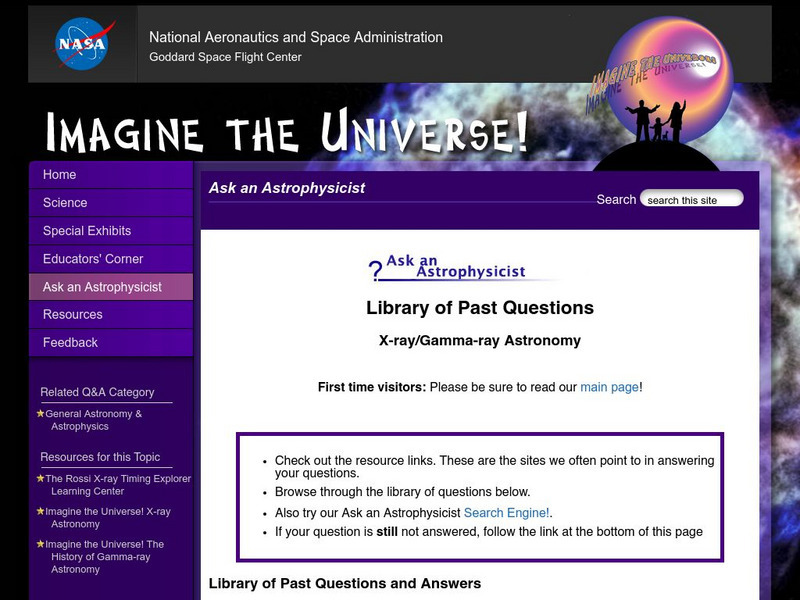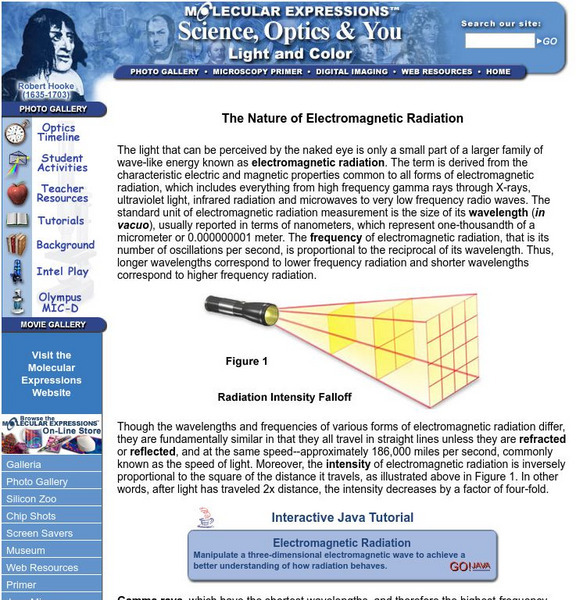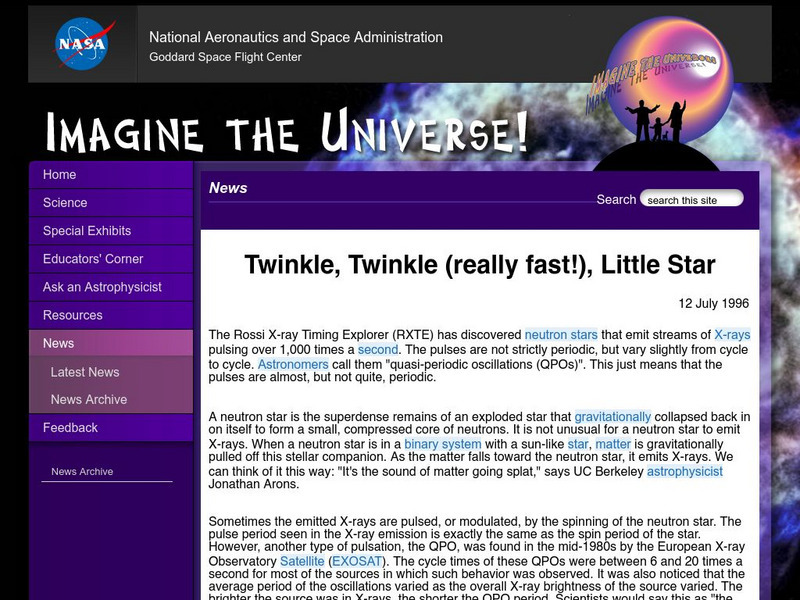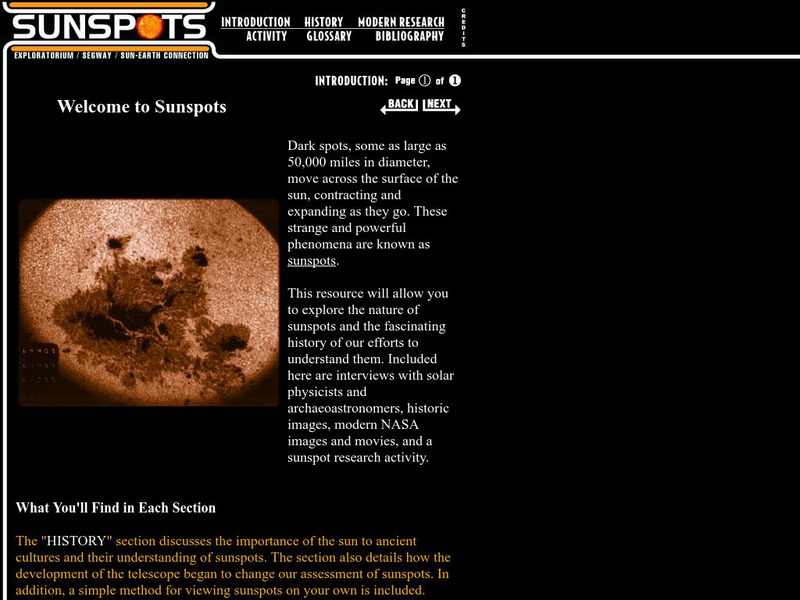Hi, what do you want to do?
Curated OER
Cell Phone Radiation
Should people be more worried about cell phone radiation? Scholars read extensive background information about the issue to prepare for a class discussion or debate. As they explore the website, they learn the main arguments for and...
Nobel Media AB
The Nobel Prize: X Rays
How were x-rays discovered? How are they made? How are they used? The Nobel Foundation offers a look at the history of x-rays, including discoveries and links to related Nobel Prize winners.
Harvard University
Smithsonian Astrophysical: Chandra X Ray Observatory
Chandra X-Ray Observatory is an space observatory designed to detect x-rays. The public web site gives information about Chandra and X-ray astronomy in general (in field guide). It also gives educational materials for teachers.
NASA
Nasa: Imagine the Universe: X Ray, Gamma Ray Astronomy
Frequently asked questions are answered about gamma rays.
Harvard University
Harvard Univ.: Chandra X Ray Observatory Center
The Chandra Observatory uses x-ray telescopes to learn more about the make-up of the universe. To learn more about x-ray telescopes and to see what they reveal, click here for the official Chandra X-ray Observatory website.
NASA
Nasa: Imagine the Universe: The History of Gamma Ray Astronomy
This NASA article discusses the history of gamma-ray astronomy. Related resources.
NASA
Nasa Star Child: Chandra X Ray Observatory (Level 2)
A description of the missions of Chandra. There is also an audio song. Glossary, graphics and printable version of page included.
Lawrence Berkeley National Laboratory
Berkeley Lab: The E Xperiment Files
Discussion of the scientific method and the use of X-ray microscopy as an experimental technique. Explains the use of X-ray microscopy in the study of malaria.
Other
Translating Virtual Reality Into Physical Reality
A fascinating site which demonstrates the application of X-ray technology and other medical imaging techniques. Site explores how CT scans can be used to create models of the human body. Several pages with incredible graphics and...
NASA
Viewing the Violent Universe: What Are Gamma Rays?
The universe produces a broad range of light, only a fraction of which is visible to our eyes. Gamma rays are nonvisible light, which also includes x-rays, ultraviolet light, infrared radiation, and radio waves.
Nobel Media AB
The Nobel Prize: The Nobel Prize in Chemistry 1964
This site from the Nobel eMuseum allows you to read about the recipient of the 1964 Nobel Prize in Chemistry, Dorothy Crowfoot Hodgkin (1910-1994 CE), who was honored "For her determinations by X-ray techniques of the structures of...
British Library
British Library: Bodies of Knowledge
Series of illustrated essays on the different ways that the human body has been represented in art and science across history considers medieval astrology, the ancient Chinese practice of acupuncture, Vitruvius's notion of body symmetry,...
University of Colorado
University of Colorado: Physics 2000: Electromagnetic Waves
Using a student-teacher dialogue format, this page discusses the nature of light as an electromagnetic wave and the electromagnetic spectrum.
Lawrence Berkeley National Laboratory
Berkeley Lab: Micro Worlds Project: Advanced Light Source
A discussion of the Advanced Light Source (ALS) facility and its use in material analysis and medicine.
NASA
Nasa: Imagine the Universe: X Ray Binary Stars
Site provides a brief introduction to binary stars. Additional resources for students and teachers on this topic are offered as well as related topics.
University of Pittsburgh
University of Pittsburgh: X Ray Crystallography Lab
This is the University of Pittsburgh crystallography departments home page. The site has links to programs, facilities, research, etc.
Florida State University
Florida State University: Nature of Electromagnetic Radiation
This site from The Florida State University provides an informational page on electromagnetic radiation discusses the characteristics and properties of its many forms including X-rays, gamma rays, ultraviolet radiation, infrared...
Other
Why Did I Choose to Become a Radiologist?
This is a great site the discusses the role of a radiologist as well as the instruments they use, what conditions they treat, and much more.
Other
Healthy Teeth: Oral Health Education Database: Prevention
Get tips on how to prevent tooth decay. Learn how flouride works, as well as how to floss and brush your teeth. More specific information on dental x-rays and different sealants is also provided.
Harvard University
Field Guide to X Ray Sources: Brown Dwarfs
Brown Dwarfs are explained. Includes illustrations.
Ducksters
Ducksters: Physics for Kids: Types of Electromagnetic Waves
Kids learn about the types of electromagnetic waves in the science of physics including microwaves, infrared, ultraviolet, radio, x-rays, and gamma rays.
NASA
Nasa: Imagine the Universe: "Twinkle, Twinkle (Really Fast!), Little Star"
"The Rossi X-ray Timing Explorer has discovered neutron stars that emit streams of X-rays pulsing over 1,000 times a second." Visit this site to read the rest of this article. Site offers additional resources as well as a Teacher's Corner.
Harvard University
Harvard Smithsonian Center for Astrophysics: The Constellations
Based on images from the Chandra X-Ray Observatory, this is an excellent glossary of all the constellations, including the ones that make up the Zodiac. Find images, photographs, and an excellent background narratives concerning each...
University of California
Sunspots: The Exploratorium's Guide to Sunspots
Examine active X-Ray regions on the sun and the possible relationship to the sunspot cycle. Through an interactive exercise and readings, you are guided through the history of our Sun! Worksheets, assessments, and more are included.
Other popular searches
- Animal X Rays Preschool
- Animal X Rays
- X Rays Mri Bones
- Preschool Lessons X Rays
- X Rays Art Preschool
- Understanding X Rays
- Bones and X Rays
- X Rays and Scans
- X Rays Preschool
- X Rays Tech
- X Rays Tech Schools
- Radiation and X Rays






















